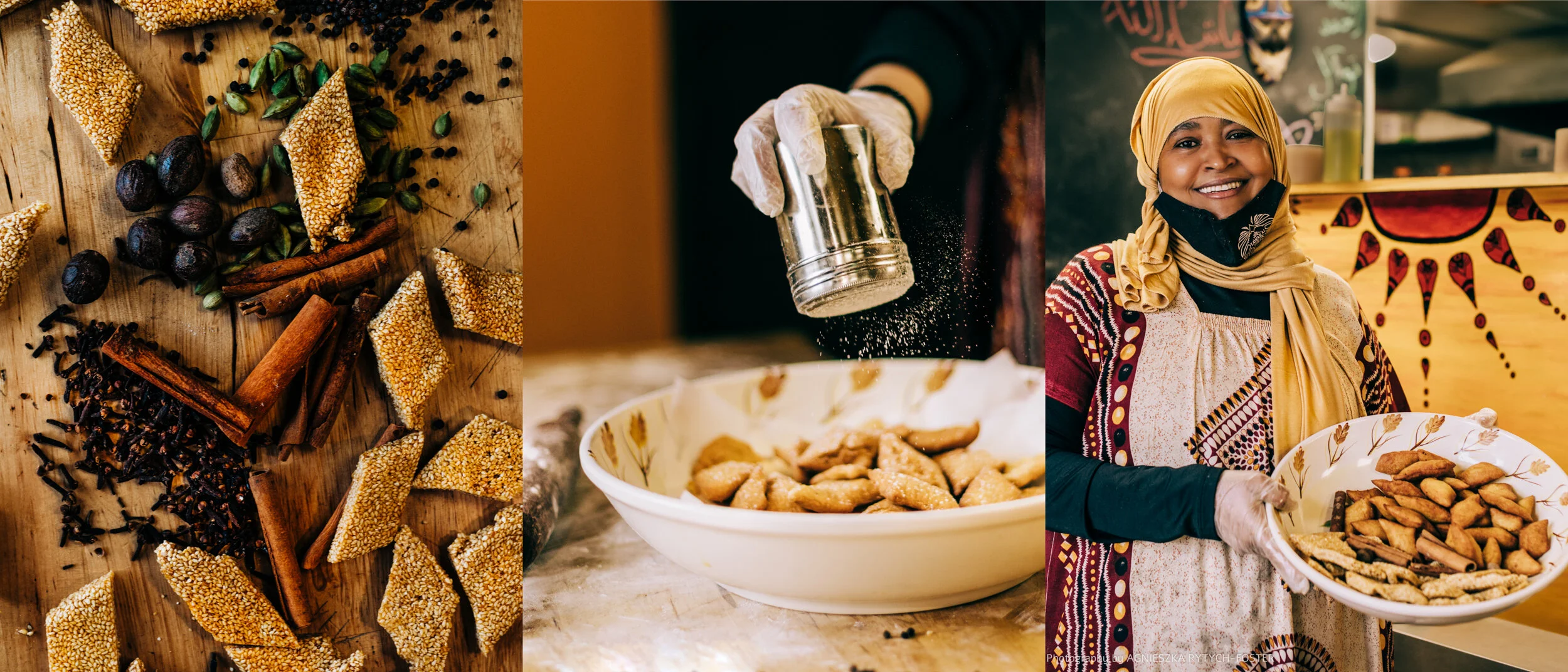Edible Food Finds: Tawakal Halal Café
Photos by Agnieszka Rytych-Foster
Yahya Noor is a difficult guy to reach. When I finally get the 37-yearold owner of East Boston’s Tawakal Halal Café on the phone in mid-February, we spend the first half hour commiserating lightheartedly about our kids’ remote-learning setups. Noor and his wife also have a third grader. As it turns out, keeping young children engaged with their schoolwork at home is a heavy lift on top of running a restaurant and cooking free meals for residents of East Boston and Chelsea—two of the Massachusetts communities hardest hit by COVID-19.
Noor opened Tawakal Halal Café in a lightly trafficked corner of East Boston in late 2018, serving the Somali dishes he learned from his mother and business partner, Munira Ahmed, and a gaggle of sisters: goat biryani, slow-cooked goat meat painstakingly stewed in herbs and spices and served with aromatic basmati rice; crunchy sambusas filled with meats or vegetables; a savory chickpea and spinach stew; and, of course, flaky chapati bread to mop up one’s plate. At first, it was mainly neighborhood folks who enjoyed Tawakal Café’s culinary treasures and trademark friendliness in a space that had seen several eateries come and go.
“That first year, anyone who walked in would tell me, ‘I hope you guys stick around,’” Noor recalls with a laugh. “I thought, ‘I hope this place doesn’t have a curse.’ But it was never a business [just] for us. As long as we have money to pay our bills and have food to introduce to people, that was enough. Community is why we do this.”
That mantra is now being put to the test. The rollercoaster began in August 2019 when a Bon Appetít writer found her way to Tawakal from Logan Airport—the perimeter of which is across the street from the tiny restaurant. The glowing review caught Noor by surprise and suddenly put Tawakal on a national radar. A few months later, Bon Appetít named Tawakal one of the top 50 new restaurants in the country. That opened the floodgates for local media and food tourists from across the region to make their way to this part of Eastie. Then, in March 2020, everything changed. Like all restaurants, Tawakal closed for a time and had to rethink its entire model. Meanwhile, Noor, who’d built a reputation as a helper in two communities, was receiving calls from organizations seeking warm meals for families struggling to find enough to eat. Noor and his team jumped into action, partnering with the East Boston Mutual Aid Network, Commonwealth Kitchen and the Somali Development Center to cook and deliver countless plates of biryani chicken with rice to families in Eastie, Chelsea and beyond. Noor recalls one delivery where a young girl took and quickly opened a bag of biryani chicken, rice and salad.
“She started screaming, saying, ‘We have chicken!’” Noor recalls. “As a human, that is something I cannot forget—the excitement that she was getting real food.”
When Noor sees neighbors lining up to receive bags of food, he thinks back to when Yahya and his family fled war-torn Somalia in 1989 and their eight years in a Kenyan refugee camp before settling in the U.S.. While living in the refugee camp, Noor’s family stood in line to receive rations from the UN Food Programme. “I’m, like, ‘Is this really happening here?’” he thinks.
Noor doesn’t know when Tawakal will be able to again welcome eaters back into its modest dining room, but takeout has been steady all winter and a makeshift patio should reopen when Boston warms up. What’s certain is that hospitality and community remain the owner’s central focus.
“We like to say, ‘You come in as a friend, you leave as family,’” Noor says. “It’s not a matter of questioning your wealth or who you are, if you have money or don’t have money. You are going to be taken care of like anyone else.”
This story appeared in the Spring 2021 issue.

